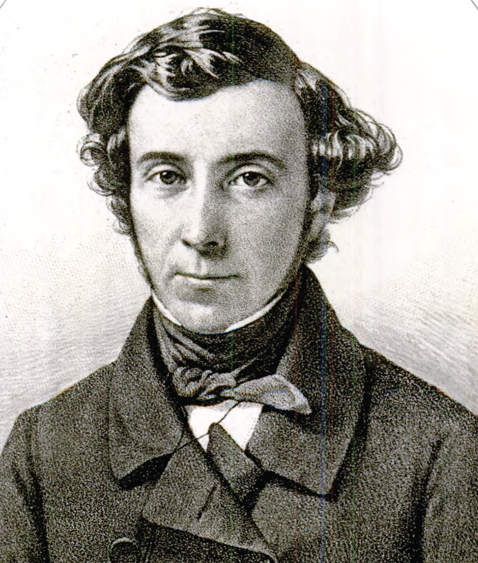Liberty Matters
A Conservative Liberal
 I would like to say a word about Tocqueville’s relationship to the liberal tradition. At various times, he described himself as a “strange” and “new kind” of liberal, thus highlighting the fact that he was not a liberal of the conventional sort. As he told his English translator Henry Reeve in a letter dated March 22, 1837, he had one passion alone, “the love of liberty and human dignity.” He did not identify that passion with either the aristocratic or democratic dispensation even if he resigned himself to a new democratic age where a kind of “decent mediocrity” might reign. In a private note to himself penned in 1841, he made clear his “hatred” for democratic demagogy and the “envious passions” and “irreligious tendencies” of the lower classes. He had an “intellectual preference for democratic institutions,” but declared himself “an aristocrat by instinct.” He passionately loved freedom, legality, and the respect for rights but not democracy. In that same note he made clear that he belonged to neither the revolutionary nor the conservative party even if he shared the ends of conservatives while repudiating both the ends and means of the revolutionary party. Only by adapting oneself to the best of democracy could those conservative ends be safeguarded in a democratic age.
I would like to say a word about Tocqueville’s relationship to the liberal tradition. At various times, he described himself as a “strange” and “new kind” of liberal, thus highlighting the fact that he was not a liberal of the conventional sort. As he told his English translator Henry Reeve in a letter dated March 22, 1837, he had one passion alone, “the love of liberty and human dignity.” He did not identify that passion with either the aristocratic or democratic dispensation even if he resigned himself to a new democratic age where a kind of “decent mediocrity” might reign. In a private note to himself penned in 1841, he made clear his “hatred” for democratic demagogy and the “envious passions” and “irreligious tendencies” of the lower classes. He had an “intellectual preference for democratic institutions,” but declared himself “an aristocrat by instinct.” He passionately loved freedom, legality, and the respect for rights but not democracy. In that same note he made clear that he belonged to neither the revolutionary nor the conservative party even if he shared the ends of conservatives while repudiating both the ends and means of the revolutionary party. Only by adapting oneself to the best of democracy could those conservative ends be safeguarded in a democratic age.Tocqueville is best seen as a conservative liberal, one who defended liberty “under God and the law” (to cite The Old Regime and the Revolution) and who rejected avant la lettre the ideal of humanity emancipated from divine and natural restraints. His was a liberalism with rare spiritual depth. He refused to choose between democratic justice and the grandeur of the human soul. He passionately opposed the collectivist state, but perceived its origins in an abstract individualism that undermined substantial human ties and bonds. He would have no sympathy for what goes by the name of libertarianism today. He believed in the dignity of politics and the imperative of self-government. He held on to few “absolute truths,” but believed in God, an immaterial soul, and the moral law. He was a theist and what one might call a Catholic fellow-traveler. A man of noble character, he believed that “life is neither all pleasure nor all pain; it is a serious responsibility of which we are duty-bound to acquit ourselves as best we can,” as he put it in a letter to a friend in 1831. This aristocrat by instinct hated slavery and had nothing but contempt for the racialism of his friend and confidant Arthur de Gobineau. Tocqueville would have despised every form of totalitarianism as well as the softness and relativism that goes by the name of liberalism today. He is an inspiration for every friend of liberty who refuses to identify democracy with bloodless nihilism or petty self-indulgence.
(In this post I have drawn on translations by Roger Boesche, Olivier Zunz, and Alan S. Kahn as well as by Frederick Brown).
Copyright and Fair Use Statement
“Liberty Matters” is the copyright of Liberty Fund, Inc. This material is put on line to further the educational goals of Liberty Fund, Inc. These essays and responses may be quoted and otherwise used under “fair use” provisions for educational and academic purposes. To reprint these essays in course booklets requires the prior permission of Liberty Fund, Inc. Please contact oll@libertyfund.org if you have any questions.